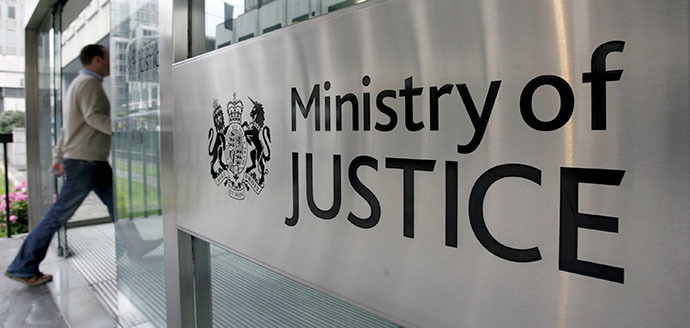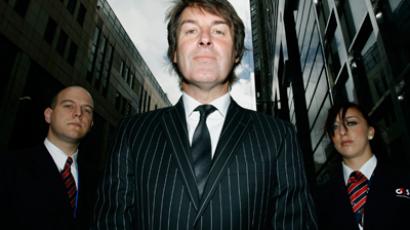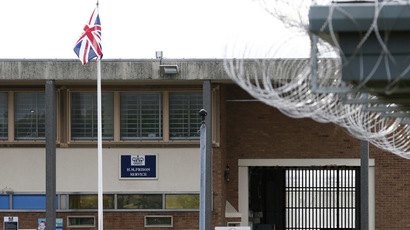Vicious Serco? UK public service company entwined in major fraud scandal
UK service company Serco has its fingers in numerous government pies, running British services from transport to prisons while staying invisible to the ‘man on the street.’ The global giant now faces investigation for fraud as it seeks new contracts.
Towards the end of September, the company was alleged in a
government report to have charged for the service of tagging
criminals who were dead, in prison, or were never tagged at all.
Serco and private security giant G4S overcharged the government
by tens of millions of pounds for the practice, which, according
to Big Four accountancy firm PricewaterhouseCoopers, could date
back as far as 1999.
The expose prompted Britain’s Serious Fraud Office to confirm
that they are assessing information on Serco provided by the
Ministry of Justice.
“We are clear that new business can only be awarded where the
integrity of the contracts and the conduct of suppliers can be
assured,” the Ministry of Justice stated.
This could lead to an official investigation, and has thrown the
company’s leadership into the spotlight as the global giant seeks
new defense contracts.
On Friday, it emerged that Serco had been one of three main
bidders filing proposals with the UK Ministry of Defence for the
role of running a £400 million ($646 million) contract. While it
can still bid, it cannot be chosen until present issues are
resolved. The deal would run for ten years.
Serco, Telereal Trillium, and Capita-led groups submitted initial
proposals in June, while the new bids were executed this week.
The contract winner is expected to be chosen by the end of the
year.
“Are they competent? Do they have the expertise? Can they
really effectively manage the service? I think the answer is
becoming clear that no they can’t,” Jane Lethbridge from
Public Services International Research Unit told RT.
Meanwhile, Serco has apparently been attempting to rejuvenate its
public image, particularly in Britain where its headquarters are
based. Some 25 percent of its £4.9 billion ($7.9 billion) annual
revenue is acquired through work with the UK government. Around
45 percent of its total revenue comes from the British public
sector.
“We will embed quickly and effectively any changes needed into
the way we do business, and we expect Serco to emerge stronger as
a result,” the company stated.
On Thursday, the Financial Times reported that Serco is predicted
to be purging its senior UK management as part of the drive to
improve its governmental relationship following its tumultuous
year. However, the news left critics doubting whether a mere
change in personnel could reform an entire company culture.
“You can’t change a culture in three months,” Andre
Spicer, professor of organizational behavior at Cass Business
School, told the paper. “The only times that might be possible
is if there’s a severe external threat or emergency but I don’t
think Serco is in that position at the moment.”
Lethbridge appeared to agree. “Their practices and their
publicity are two different things,” she said.

Further commentators have urged caution on the part of Serco.
“One of the reasons that these public service markets often go
wrong is because the pace and scale of reform is causing
significant problems. In the rush to develop public service
markets, avoidable errors have been made in design and
oversight,” Nechal Panchamia, a researcher at the Institute
for Government, told RT.
“What we would urge the government is to slow down, learn quickly
from mistakes, and correct them out of the system before another
mistake grabs the headline,” she said.
The incident marks the latest in a long line of controversies
surrounding the company.
In August, the City of London police were called in by UK Justice
Secretary Chris Grayling to probe alleged fraud by the company’s
staff working on a £285 million ($460 million) prisoner escorting
contract.
“It has become very clear there has been a culture within
parts of Serco that has been totally unacceptable,” Grayling
said upon launching the investigation.
Early in September, Serco was booted off the FTSE 100. Following
the September fraud allegations, Serco's shares dropped 8p (13
cents) - nearly 1.5 percent - to 543p (942 cents) over the course
of a day.
The fraud-related claims follow a list of allegations of
detainees facing sexual abuse at Serco-run UK immigration center
Yarl’s Wood in September. The reports were corroborated later in
the month by further detainees, according to the Guardian.
Although companies like Serco, Capita, and G4S are behind public
bicycle rental schemes, speed cameras, military and nuclear
weapons contracts, ambulances, and the government’s work program
for the jobless, it is apparent that the nation’s general public
still remain relatively oblivious to the major role they play in
modern society. An RT survey conducted on the streets of London
indicated that the average ‘man on the street’ recognized very
few of the company names mentioned.














